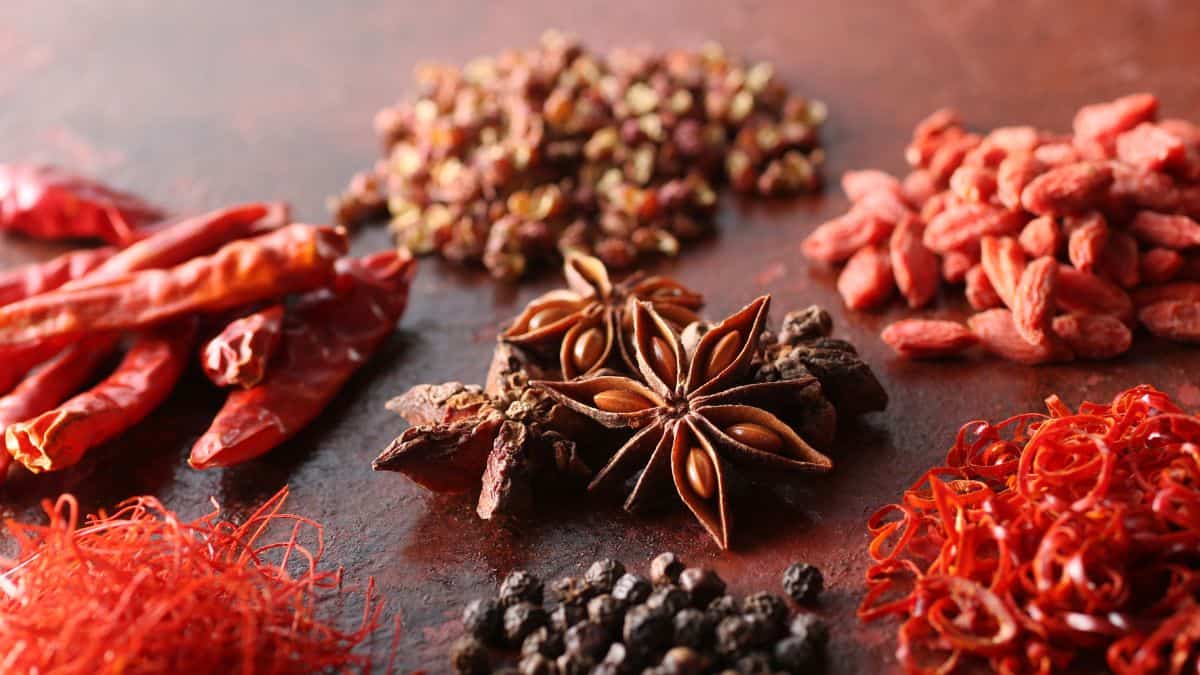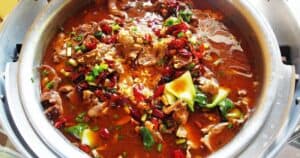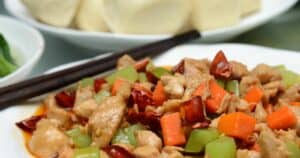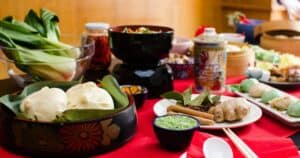Chinese restaurants are known globally for their delicious spicy foods. Also, the
The five-spice powder, chili pepper, ginger, garlic/onions, sesame seeds, bay leaves, and turmeric powder are seven essential spices Chinese restaurants use for spicy food. One of the seven spices combines five individual spices (cinnamon, star anise, cloves, fennel, and peppercorns) collectively known as the Chinese five-spice.
Chinese cuisine is known worldwide as one of the spiciest foods, and, interestingly, they are also one of the most palatable and enjoyable foods. As a result, with so many do-it-yourself enthusiasts, several people want to know how many spices go into preparing one of the world’s most delicious dishes. Let’s find out the spicy food secret of most Chinese restaurants in this article!
What Are The Seven Essential Spices Used by Chinese Restaurants?
Chinese cuisine relies heavily on balance to create the exotic taste that makes them known worldwide. Some of the spices Chinese restaurants use for spicy foods are common and well known, while others are rare. Here is a list of the essential spices used in Chinese restaurants for preparing spicy foods.
The Five-spice powder
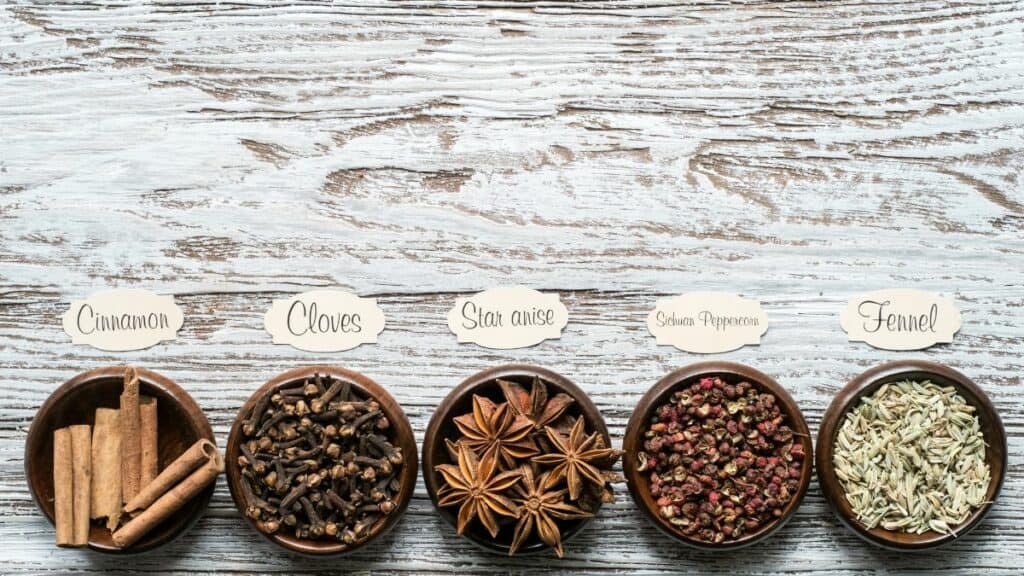
The five-spice powder is a five-in-one
The five-spice powder combines five individual herbs and spices: cinnamon, star anise, cloves, fennel, and peppercorns. Together they yield an aromatic blend of spicy and slightly sweet flavors to create the taste balance that is unique to traditional Chinese cuisine.
Although you can easily buy the five-spice powder in your local grocery store, you should know that most of them are customized to suit several regions. However, the beauty of the five-spice powder is that you can prepare yours at home.
Here is a list of the individual spices that compose the five-spice powder:
Cinnamon
The Chinese cinnamon is the type of cinnamon used in making the five-spice powder. It is also known as cassia cinnamon or gui pi and is thicker and darker than your regular cinnamon.
Chinese cinnamon doesn’t have an intense aroma, so it blends so well in the five-spice powder. Regardless, if you make your own five-spice powder, you can use regular cinnamon. Still, you have to be careful of the quantity to avoid overshadowing the other ingredients in the five-spice powder. Chinese cinnamon is an excellent seasoning for stews and marinades.
Star anise
Star anise is star-shaped, with eight protrusions and dark shiny seeds. It has a distinct flavor, perfect for stews, braised, and slow-cooked dishes. It is an essential component of the five-spice powder.
Cloves
They are the dried, unopened flower buds of an evergreen tree and offer a strong sweet and pungent aroma in Chinese cuisine. Cloves can be used whole to make infusions or ground into powder as a seasoning, and they are perfect as meat seasonings and soup flavoring.
Fennel
Fennel seeds are usually used in stews and preparing meat dishes. It has a licorice flavor similar to that of the star anise. It is used to make Chinese curry and is more common in the southern part of China and among women because of its traditional belief to enhance the yin aspect of the body.
Peppercorns
Sichuan peppercorns are distinct for their spicy solid flavors, and they also possess a substantial numbing intensity that makes them similar to black peppers. They are used in Chinese cuisine to mask meat odors or mixed with salt for fish, meat, and vegetable dishes. In traditional Chinese medicine, peppercorns are used to treat stomach disorders and colds.
Fun Fact: According to traditional Chinese medicine, the Chinese five-spice is based on the five elements (fire, water, earth, air, metal), which they believe are manifested in different body parts. Therefore, an imbalance in these elements can result in illness. So, these herbs and spices have been used to restore balance in the body. In the same way, the Chinese five-spice powder became a culinary force for restoring gustatory balance in traditional Chinese cuisine.
Chili pepper
Chili pepper is an essential
Ginger
Although ginger is a herb, it is loosely regarded as a
Garlic and Onions
Although garlic has an off-putting smell, it is an essential
Sesame seeds
Both black and white sesame seeds are vital in Chinese spicy food cuisine. They add texture and flavor to traditional dishes and are usually sprinkled on top of meals as garnishing. Sesame seeds also yield sesame oil, which is an essential component for making most sauces and Chinese dips.
Bay Leaves
They are popularly used in traditional Chinese cuisine to mask the odor of meat. Also, bay leaves are essential for making slow-cooked meat dishes because the flavor releases gradually with continuous heating. Bay leaves are also used for adding flavor to pickled vegetables.
Turmeric powder
Turmeric powder is mainly used as a blend with curry powder. It is famous for its natural bright yellow color, which adds color and excitement to most dishes. It is also a potent anti-inflammatory agent.
Below is a table summarizing the seven essential spices used in Chinese restaurants and other crucial details.
| Chinese Spices | Primary Uses | Health Benefits | Risks, side effects/warning |
|---|---|---|---|
| Ginger | For stir-fried dishes soups, and sauces | For colds/flu Balances body fluids Stress relief Anti-inflammatory properties | No risks or side effects. |
| Garlic and onions | For stir-fried dishes Used as a food flavoring Meat dishes | Antibacterial Anti Inflammatory Balances blood pressure Enhance blood circulation | No risks/side effects for onions. Garlic has an offensive odor. |
| Star anise | For food seasoning. An essential component of five-spice powder | Antioxidants Supports respiratory health Antifungal agent | No risks in Chinese food flavoring, however, you should be careful of the Japanese star anise, which is not to be ingested. |
| Cloves | An essential component of five-spice powder Meat seasoning Soup flavoring | Aids digestive health Immune support Oral diseases Aphrodisiac properties | Prevents blood clots and is not suitable for people on warfarin medication or other anticoagulant and antiplatelet medication. |
| Chili pepper | For making chili powders and sauces Food seasoning | Essential vitamins and minerals | High capsaicin might be harmful to people with ulcers, asthma, and high blood pressure. |
| Chinese cinnamon | Flavoring for pastries | Antioxidant For colds and flu Mild antidepressant | High coumarin could be a potential risk for most people with low blood sugar with Chinese cinnamon compared to regular cinnamon. |
| Sesame seeds | Food seasoning For making sesame oil used in most sauces | Supports bone health Antioxidants Balance hormones | It is a potential allergen for people with nut allergies. Blood-thinning properties. |
| Fennel seeds | Food flavoring | Balances female hormones Aids lactation Lowers blood sugar level | Potential allergen for most people Blood-thinning properties. |
Frequently Asked Questions
How do most Chinese restaurants cook so fast?
Most Chinese restaurants cook so quickly because they utilize very high temperatures of about 200 degrees centigrade, approximately 392 degrees Fahrenheit. Also, food cooks faster in a smaller wok, leading to the cooking speed of most Chinese restaurants.
What traditional spice powder makes foods in Chinese restaurants so spicy?
Chili powder is like an all-in-one
What sauce is typical among most Chinese restaurants for spicy foods?
Most Chinese restaurants use Cantonese sauce as a base for most dishes. It is made of soy sauce to create a distinct flavor in most Chinese restaurant dishes, and it is also essential for releasing the fifth flavor, Umami.
Final Thoughts
Chinese cuisine remains among the most appreciated dishes worldwide thanks to the proliferation of Chinese restaurants. The reason is that natural

